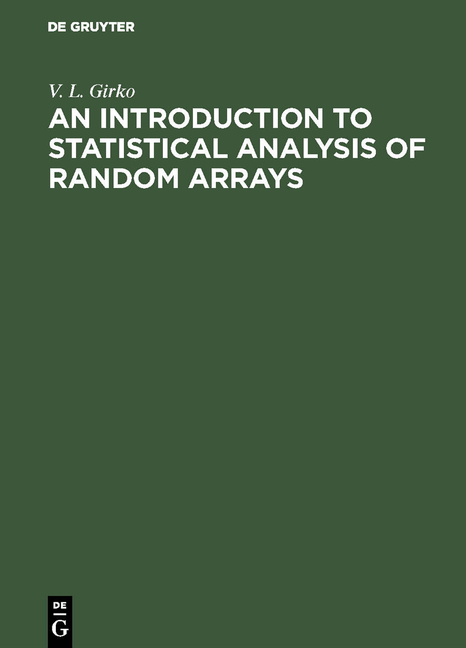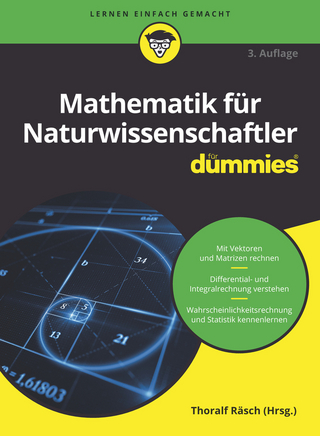
An Introduction to Statistical Analysis of Random Arrays
De Gruyter (Verlag)
9783110354775 (ISBN)
Frontmatter -- CONTENTS -- List of basic notations and assumptions -- Preface and some historical remarks -- Chapter 1. Introduction to the theory of sample matrices of fixed dimension -- Chapter 2. Canonical equations -- Chapter 3. The First Law for the eigenvalues and eigenvectors of random symmetric matrices -- Chapter 4. The Second Law for the singular values and eigenvectors of random matrices. Inequalities for the spectral radius of large random matrices -- Chapter 5. The Third Law for the eigenvalues and eigenvectors of empirical covariance matrices -- Chapter 6. The first proof of the Strong Circular Law -- Chapter 7. Strong Law for normalized spectral functions of nonselfadjoint random matrices with independent row vectors and simple rigorous proof of the Strong Circular Law -- Chapter 8. Rigorous proof of the Strong Elliptic Law -- Chapter 9. The Circular and Uniform Laws for eigenvalues of random nonsymmetric complex matrices with independent entries -- Chapter 10. Strong V-Law for eigenvalues of nonsymmetric random matrices -- Chapter 11. Convergence rate of the expected spectral functions of symmetric random matrices is equal to 0(n-1/2) -- Chapter 12. Convergence rate of expected spectral functions of the sample covariance matrix ?m„(n) is equal to 0(n-1/2) under the condition m„n-1?c<1 -- Chapter 13. The First Spacing Law for random symmetric matrices -- Chapter 14. Ten years of General Statistical Analysis (The main G-estimators of General Statistical Analysis) -- References -- Index
Frontmatter -- CONTENTS -- List of basic notations and assumptions -- Preface and some historical remarks -- Chapter 1. Introduction to the theory of sample matrices of fixed dimension -- Chapter 2. Canonical equations -- Chapter 3. The First Law for the eigenvalues and eigenvectors of random symmetric matrices -- Chapter 4. The Second Law for the singular values and eigenvectors of random matrices. Inequalities for the spectral radius of large random matrices -- Chapter 5. The Third Law for the eigenvalues and eigenvectors of empirical covariance matrices -- Chapter 6. The first proof of the Strong Circular Law -- Chapter 7. Strong Law for normalized spectral functions of nonselfadjoint random matrices with independent row vectors and simple rigorous proof of the Strong Circular Law -- Chapter 8. Rigorous proof of the Strong Elliptic Law -- Chapter 9. The Circular and Uniform Laws for eigenvalues of random nonsymmetric complex matrices with independent entries -- Chapter 10. Strong V-Law for eigenvalues of nonsymmetric random matrices -- Chapter 11. Convergence rate of the expected spectral functions of symmetric random matrices is equal to 0(n-1/2) -- Chapter 12. Convergence rate of expected spectral functions of the sample covariance matrix ?m"(n) is equal to 0(n-1/2) under the condition m"n-1?c<1 -- Chapter 13. The First Spacing Law for random symmetric matrices -- Chapter 14. Ten years of General Statistical Analysis (The main G-estimators of General Statistical Analysis) -- References -- Index
| Erscheint lt. Verlag | 1.12.1998 |
|---|---|
| Verlagsort | Berlin/Boston |
| Sprache | englisch |
| Maße | 155 x 240 mm |
| Gewicht | 1240 g |
| Themenwelt | Mathematik / Informatik ► Mathematik ► Allgemeines / Lexika |
| Mathematik / Informatik ► Mathematik ► Statistik | |
| Schlagworte | . • Allgemeines, Lexika • ALTOMARE • GSTM61 • Markov • Mathematics • operators • probability & statistics • probability and statistics • Statistics • Statistik • Zufall • Zufallsgröße |
| ISBN-13 | 9783110354775 / 9783110354775 |
| Zustand | Neuware |
| Informationen gemäß Produktsicherheitsverordnung (GPSR) | |
| Haben Sie eine Frage zum Produkt? |
aus dem Bereich


